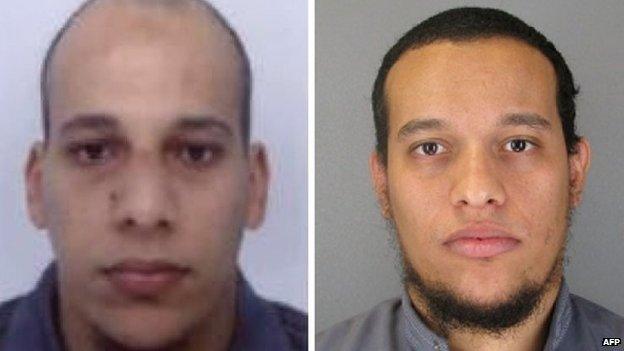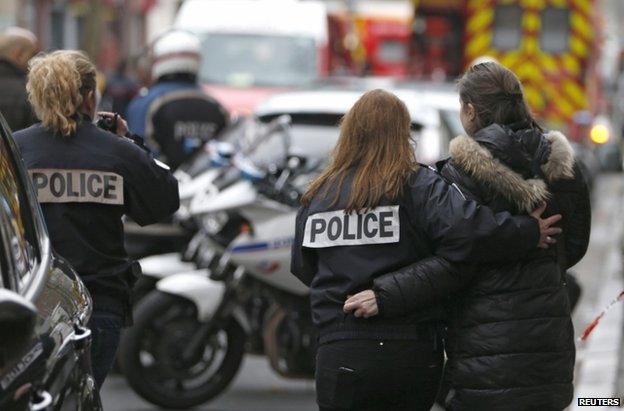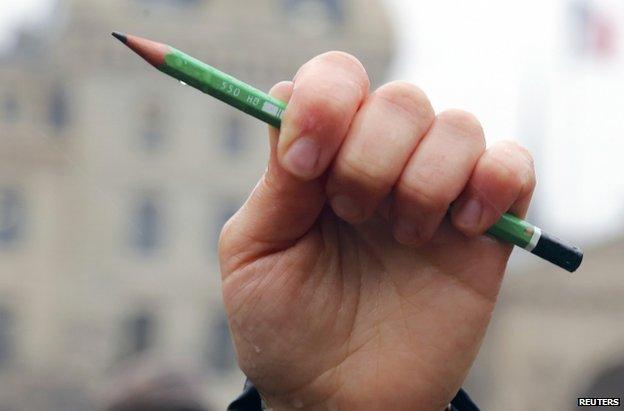Charlie Hebdo attack: Suspects 'rob service station'
- Published
Damian Grammaticas describes seeing armed police and military helicopters in the area around the service station
The two main suspects in the Islamist attack on Charlie Hebdo magazine in Paris are said to have robbed a service station in the north of France.
Anti-terrorism police have converged on an area near Villers-Cotterets where the gunmen were reported by French media to have stolen food and petrol.
France has observed a minute's silence for the 12 people killed at the office of the satirical magazine.
Earlier, a gunman shot dead a policewoman south of Paris and fled.
It is unclear if the attack in Montrouge, in which a second person was seriously injured, was linked to the Charlie Hebdo shooting, but French prosecutors say they are treating it as a "terrorist act", AFP reports.
Narrowed search
The manager of the service station that was robbed on the RN2 road, in the Aisne region, at about 10:30 (09:30 GMT) said the attackers fit the description of the two men, and were heavily armed with Kalashnikovs and rocket-propelled grenade launchers.
Cherif Kouachi was known to police, as the BBC's Frank Gardner reports
The two prime suspects, Cherif and Said Kouachi, are said to have driven off in a Renault Clio car, apparently the same vehicle hijacked in Paris soon after the attack at Charlie Hebdo.
The highest security alert has been imposed in the Picardy region where police are searching for both men, officials say. Police have blocked a road running between the N2 road and the village of Longpont, where a witness says officers have been making house-to-house inquiries.
According to French commercial channel BFMTV, police are monitoring all of the main entry roads into the capital.
A third man who was initially sought handed himself in to police in the eastern city of Charleville-Meziere late on Wednesday. It is not yet clear if he is regarded as a suspect.

Charlie Hebdo attack sequence


At the scene: Chris Morris, Europe correspondent
Several locations in Paris held a minute's silence for the victims of the attack on Charlie Hebdo
There is obviously a sense of unease in Paris, with another fatal armed attack so soon after the murders at Charlie Hebdo. But most people are also going about their daily business - sending the message that life goes on.
On this day of national mourning, though, with church bells ringing throughout the land, there has been no time for reflection for the police and security services. The fear is of further copycat attacks, or that those already involved could try to strike again.
For now that is the focus of official efforts - a huge manhunt is under way, with the police hoping that they may be closing in on the two leading suspects in the Aisne region, north-east of Paris.
Security has also been increased at public places to try to provide extra reassurance. Calls for calm, and above all for unity, will continue to be heard.

Meanwhile, the lawyer for Charlie Hebdo, Richard Malka, confirmed that next week's edition of the magazine would go ahead on Wednesday and would have a print run of one million, instead of the normal 60,000 copies.
The gunman involved in the separate attack in Montrouge was reportedly armed with a machine-gun and a pistol and wore a bullet-proof jacket.
A local resident, Ahmed Sassi, said he saw a man dressed in dark clothes run up and shoot the female police officer "at point blank range".

Charlie Hebdo victims

Those killed (from left) include economist Bernard Maris, prominent cartoonists Wolinski and Cabu, Charlie Hebdo editor Stephane Charbonnier and cartoonist Tignous
Economist and regular magazine columnist Bernard Maris, 68, known to readers as Uncle Bernard
Cartoonists Georges Wolinski, 80, and Jean "Cabu" Cabut, 76
Charlie Hebdo editor and cartoonist Stephane "Charb" Charbonnier, 47, who had been living under police protection since receiving death threats
Cartoonists Bernard "Tignous" Verlhac, 57, and Philippe Honore, 73
Mustapha Ourrad, proof-reader
Elsa Cayat, psychoanalyst and columnist, the only woman killed
Michel Renaud, who was visiting from the city of Clermont-Ferrand
Frederic Boisseau, 42, caretaker, who was in the reception area at the time of the attack
Police officers Franck Brinsolaro, who acted as Charb's bodyguard, and Ahmed Merabet, 42, who was shot dead while on the ground

'Revenge' attacks
Seven people believed to be connected to the Kouachi brothers have been detained in the towns of Reims and Charleville-Mezieres, as well as in the Paris area.
Cherif Kouachi was sentenced in 2008 to three years in prison for belonging to a Paris-based group sending jihadist fighters to Iraq.
Since the shootings, there appear to have been a number of revenge attacks on Muslims reported by French media, though nobody was hurt:
Two shots were fired at a Muslim prayer room in the town of Port-la-Nouvelle in the southern region of Aude on Wednesday evening
A Muslim family was shot at in their car in Caromb, in the southern region of Vaucluse
Dummy grenades were thrown during the night at a mosque in Le Mans, western France
The slogan "Death to Arabs" was daubed on the door of a mosque in Poitiers, central France, during the night
A blast hit a kebab shop beside a mosque in Villefranche-sur-Saone in central France

French police released photos of the Kouachi brothers - Cherif (L) and Said (R)

Police officers assisted a woman at the scene of Thursday's shooting in Montrouge

People held up symbolic pencils during the public silence outside Notre Dame cathedral in Paris
Paris has been placed on the highest terror alert and extra troops have been deployed to guard media offices, places of worship, transport and other sensitive areas.
Eight journalists - including the magazine's editor - died along with a caretaker, a visitor and two policemen when masked men armed with assault rifles stormed the Charlie Hebdo offices during an editorial meeting on Wednesday. Eleven people were also wounded, some seriously.
The shooting in Montrouge happened as people prepared for minute's silence, as Christian Fraser reports
Witnesses say the gunmen shouted "we have avenged the Prophet Muhammad" and "we killed Charlie Hebdo", as well as "God is Great" in Arabic.
The magazine's office was firebombed in 2011. It had angered some Muslims by printing cartoons of the Prophet Muhammad as part of its irreverent take on news and current affairs.
People stood in silence in public spaces across France at midday (11:00 GMT) as the bells of Notre Dame cathedral in Paris and churches nationwide tolled in mourning.
Vigils were held through the night in Paris and cities worldwide in tribute to the dead. Many demonstrators held up placards reading "Je suis Charlie" (I am Charlie) in solidarity with the victims.
French President Francois Hollande said the country's tradition of free speech had been attacked and called on all French people to stand together.
Many cartoonists have been using the "Je suis Charlie" slogan in drawings to commemorate the attack
Cartoon tributes are circulating on social media, sending out the message of press freedom.
Thursday's national day of mourning is only the fifth held in France in the past 50 years.

National Days of Mourning in France
12 November 1970 - Death of former President Charles de Gaulle
6 April 1974 - Death of President Georges Pompidou
11 January 1996 - Death of former President Francois Mitterrand
14 September 2001 - 9/11 attacks on New York and Washington
3 April 2005 - Death of Pope John Paul II